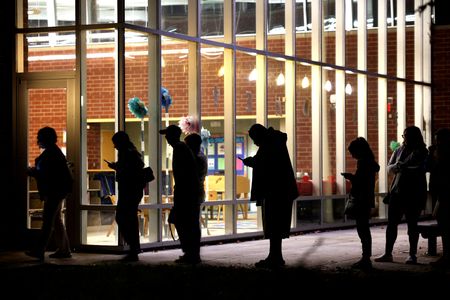By Andrew Chung
WASHINGTON (Reuters) – Though the U.S. Supreme Court appears reluctant to free North Carolina Republican lawmakers from judicial scrutiny as much as they want on voting rules, the restrictions it may allow still could give politicians more power over the way federal elections are conducted at a delicate time for American democracy.
Hearing arguments on Wednesday in a fight over a map laying out the state’s 14 U.S. House of Representatives districts, some of the conservative justices balked at the broadest arguments by these lawmakers arising from a contentious legal theory that would remove any role of state courts and state constitutions in regulating presidential and congressional elections.
The court has a 6-3 conservative majority. Some combination of the six conservatives can be expected to determine the outcome, considering the opposition by the three liberal justices to the “independent state legislature” doctrine.
Three of the conservatives – Chief Justice John Roberts and Justices Brett Kavanaugh and Amy Coney Barrett – are likely to be pivotal. They seemed to focus on a narrower option than the Republican lawmakers sought – curbing state court authority to overrule voting policies crafted by state politicians in instances in which judges act more like legislators.
“It would be fair to say, whether a broad or narrow ruling, it’s a win for North Carolina lawmakers,” said Jason Snead, a conservative elections expert.
This type of “middle ground” ruling, as some court watchers have called it, would still place the lawmakers in the “driver’s seat” when it comes to regulating federal elections, said Snead, who heads the Honest Elections Project, a group that sometimes opposes bids for more expansive voting rules favored by liberal organizations and Democrats.
“You would end up in a better position as a legislature in terms of having your authority to write election laws affirmed,” Snead said.
This outcome would not be as onerous as completely cutting state courts out of the elections process, according to Richard Hasen, a UCLA School of Law election law expert.
But it is still a “bad alternative,” Hasen said, because it would let the Supreme Court second-guess state court rulings protecting the rights of voters – even in highly charged elections cases including presidential races.
“State legislators would get another bite at the apple,” Hasen said.
The case has come to the Supreme Court at a time of sharp divisions over voting rights and American political polarization, particularly in the aftermath of Republican former President Donald Trump’s false claims that the 2020 election was stolen from him through widespread voting fraud.
Democrats have accused Republican state legislatures of undercutting the rights of voters by imposing new restrictions in the aftermath of Trump’s claims, while Republicans assert that they are simply guarding against fraud.
State courts in North Carolina threw out a congressional map drawn by the Republican legislators as unlawfully biased against Democratic voters and replaced it with one drawn by a bipartisan group of experts. In their appeal to the Supreme Court, the Republicans argued that North Carolina’s top court usurped their authority by throwing out the map.
Proponents of the doctrine contend that the U.S. Constitution gives state legislatures authority over election rules and electoral district maps, cutting out any role for entities like state courts. That view is based on the Constitution’s statement that the “times, places and manner” of federal elections “shall be prescribed in each state by the legislature thereof.”
If adopted, it could restrict a crucial check on partisan political power, making it easier for a state legislature’s majority party to draw the boundaries of U.S. congressional districts to entrench its own power, a practice called gerrymandering. It could stymie challenges on issues as varied as voter-identification requirements, mail-in ballots and drop boxes, which Republicans have sought to restrict in some states.
Some of the conservative justices signaled a potential appetite for applying the view of then-Chief Justice William Rehnquist in his concurrence to the court’s decision that tipped the 2000 presidential election to Republican George W. Bush. In that context – a fight over counting ballots in Florida – Rehnquist said the U.S. Constitution limits the authority of state courts.
Kavanaugh told David Thompson, the lawyer representing the Republicans, that his position seemed to “go further” than Rehnquist’s view that state courts would still have a role to ensure that state lawmakers’ actions complied with state law.
A federal court review of that process, Kavanaugh added, “should be a check to make sure that state courts had not significantly departed from state law.”
Embracing this view raises concerns over state sovereignty, Neal Katyal, a lawyer representing the voters and voting rights groups that challenged the Republican-drawn map, told the justices.
“This court has never second-guessed state court interpretations of their own constitution,” said Katyal.
Solicitor General Elizabeth Prelogar, arguing for President Joe Biden’s administration backing the voters, agreed that intervention in such matters by the Supreme Court should be limited to situations in which a state court is policymaking, “not acting like a court.”
Liberal Justice Elena Kagan warned that adopting such a standard to strike down a state court might be “satisfied too easily” because judges frequently accuse other judges of engaging in policymaking rather than law.
“These are things that judges say to each other all the time. How is this going to be a check that’s used rarely?” Kagan asked.
Thomas Wolf, an attorney at New York University School of Law’s Brennan Center for Justice, said if the Supreme Court gives itself too much leeway to intervene in state court disputes, it risks appearing politically motivated and lawless.
Conservative scholars reject the view that the doctrine would give state politicians unbridled power because the actions of legislatures would remain constrained by the U.S. Constitution and federal law.
The Supreme Court’s ruling is due by the end of June. (This story has been refiled to correct the year 2020 to 2000 in paragraph 16)
(Reporting by Andrew Chung; Editing by Will Dunham)











